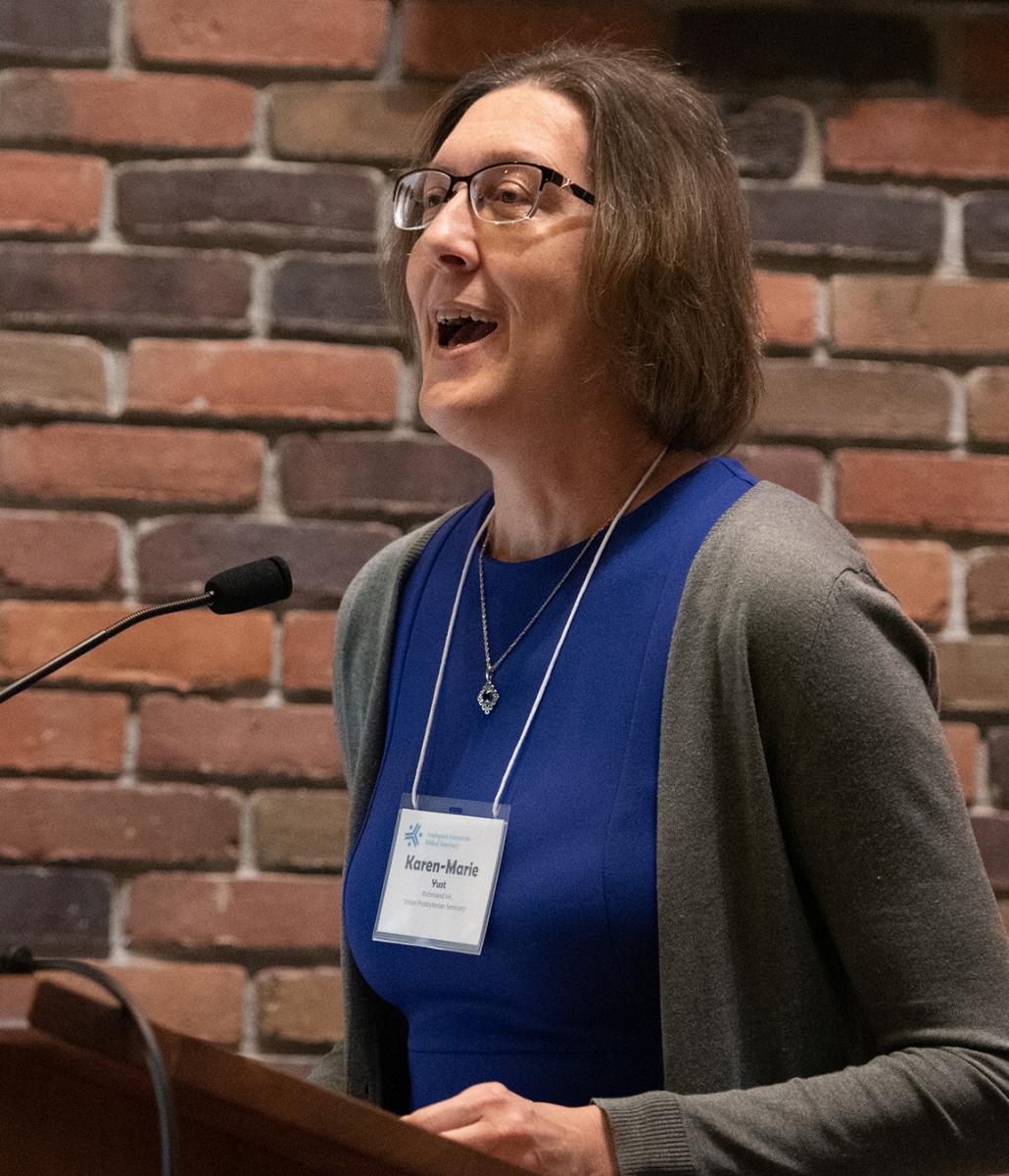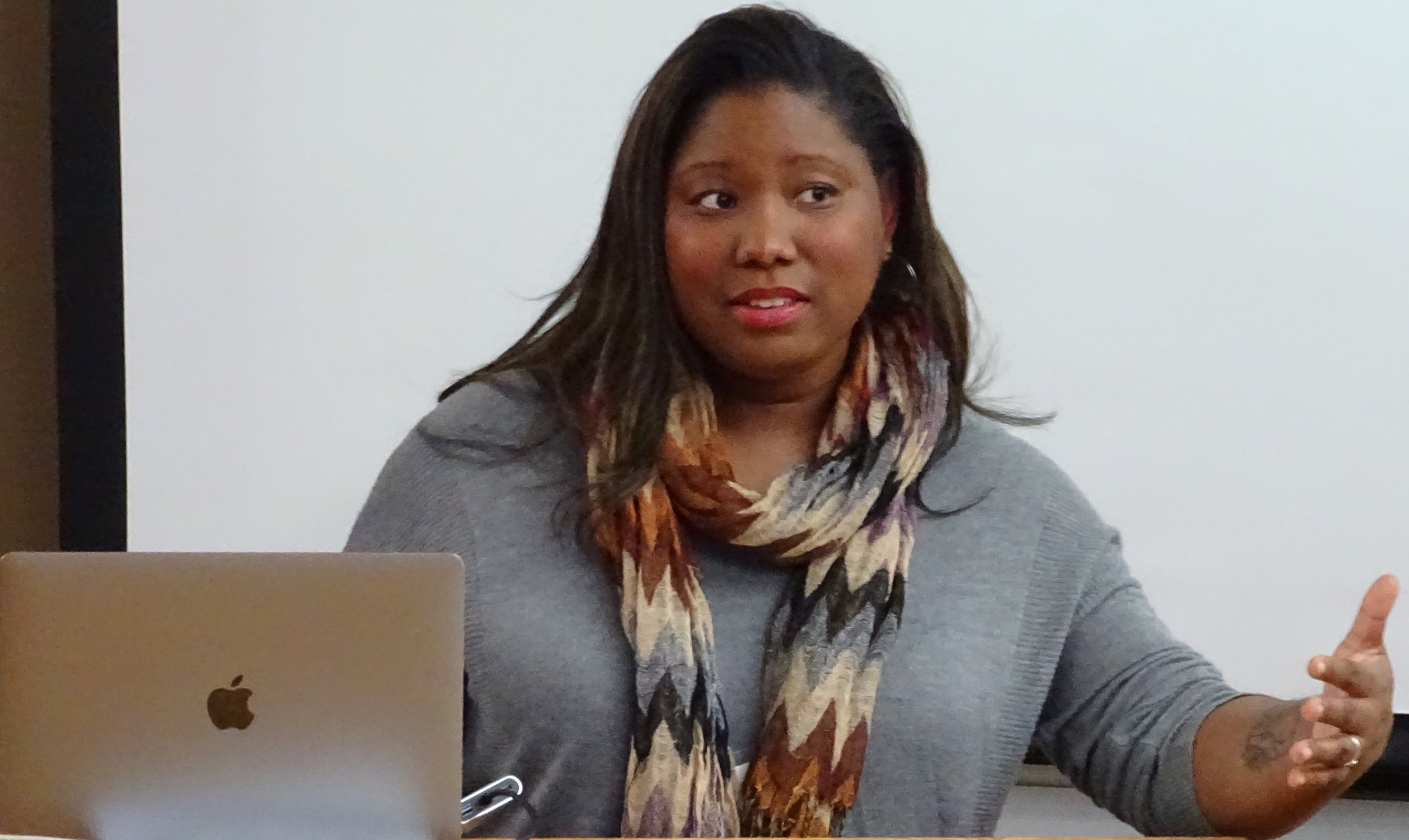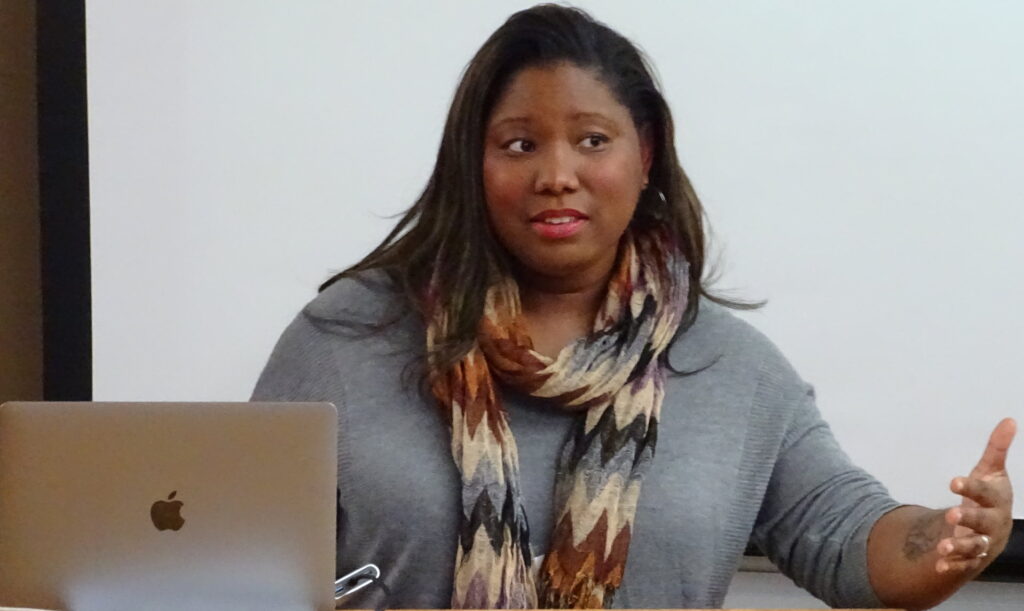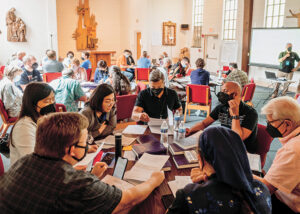Elkhart, Ind.—In an age when people turn instinctively to Siri for directions, Mennonite church leaders and educators found that Divine Lady Wisdom’s words from Proverbs have an amazing wealth of guidance for navigating digital culture.
Lady Wisdom, six fools—Schemer, Scoffer, Gossip, Lazybones, Glutton and Adulterer—and a wise person all emerged from the pages of the Bible to join seminary professors, church leaders and educators in guiding and challenging more than 150 participants at “Shaping faith in a digital culture,” held at Anabaptist Mennonite Biblical Seminary (AMBS) in Elkhart, from March 2 to 5. Actors representing the Wise One and six fools showed that Lady Wisdom continues to have relevance in the digital age.
A new form of colonialism
Andy Brubacher Kaethler, associate professor of Christian formation and culture at AMBS and a plenary speaker, emphasized discerning whether a specific technology distorts Christian memory and Christian practices. He warned against technology that has created a new form of colonialism: the conquest and commodification of the human mind.
Brubacher Kaethler referenced media theorist Douglas Rushkoff when he asked, “Is technology on ‘Team Human’?” Captology, the study of using persuasive technologies to “capture” the human mind, sees people as commodities to drive technological economy.
“If Rushkoff is right,” Brubacher Kaethler said, “whether we use social media for the purposes of faith formation or to hook up with someone on Tinder, human emotions and thought processes are being mined and exploited for financial gain in either case.”
Brubacher Kaethler posed several questions for the church to consider for discerning the extent to which it uses technology: (1) What is the problem being solved by adopting this technology? Whose problem is it? (2) Does the technology form me to expect things in life to be fast, easy and safe? (3) Does using technology help me become more deeply and positively self-aware of my body and of my emotions, or does it numb me and make me feel more negatively self-conscious and lead to self-loathing?
“Not using a technology at all is a real option if it distorts Christian memory and Christian practice,” Brubacher Kaethler said. “Without the real option of rejecting use of a technology, discernment is reduced to justification.”

A means to the end of loving God and neighbour
David C. Cramer, managing editor of the Institute of Mennonite Studies, a sessional faculty member at AMBS, and the teaching pastor of Keller Park Church in South Bend, Indiana, looked to the Amish, St. Augustine of North Africa, and Immanuel Kant, to seek answers on using digital technology to enhance ministry during his plenary presentation. His resulting formula is that technology should be a means to the end of loving God and neighbours, never an end in itself. However, digital technology is designed to be addictive, Cramer said, rather than to be used selectively as a tool for ministry.
According to Cramer, the Amish evaluate technology by discerning whether the benefits gained outweigh benefits lost. They ask, “Does a new technology strengthen or diminish the community?” Also, intention trumps convenience in Amish communities. Thus, owning a car is prohibited, but accepting a ride to a distant funeral is acceptable because it allows them to comfort a grieving family.
Cramer advised church leaders and educators not to flee digital technology, but not to accept usage uncritically, either. Emojis of heart and thumbs up aren’t adequate substitutes for a pastoral visit or a phone call, he said.

Opportunities and challenges
Karen-Marie Yust, professor of Christian education at Union Presbyterian Seminary in Richmond, Va., and the author of Real Kids, Real Faith, presented two plenary sessions. The first described the opportunities digital culture offers for faith formation, and the second highlighted some of the challenges of digital culture.
“We can’t change reality, but we can change how we react to it,” she said, suggesting both practices of mindfulness as Christians engage digital media and ways to educate children in online resilience. “Being mindful begins to reveal our values,” Yust said. “The alternative is wandering lost in a digital landscape that can overwhelm us.”
Yust suggested that adults can model this mindfulness as they form the lives of children and youth in their community. “Children need to be resilient online,” she said. “They need to be able to take care of themselves when they are engaging online materials. . . . We also need them to become digital citizens so that they can use digital tools to take care of the world around them.”
Yust believes that online interactions have the potential to help teens develop agency and create space to self-regulate, but she cautioned against allowing concerns about online behaviour to distract from addressing bullying and sexual harassment that happen in person in school spaces.
A healing way to communicate
During a worship session, Osheta Moore, author of Shalom Sistas, blogger and speaker, described herself as “a syndicated MennoNerd” and “an Anabaptisty kingdom-minded woman who can’t help but talk about Jesus.” Although she was hesitant to begin blogging, seeing it as a “time suck,” after a decade of online ministry, she said she finds it a healing way to communicate with “the world full of hurting people looking for love. They are deeply loved by God, and they don’t even know it.”
This was the first joint conference in which AMBS’s annual Pastors and Leaders event combined with Mennonite Church U.S.A.’s new annual Deep Faith gathering. Both conferences are designed to reach faith formation leaders.
Related story:
Learning to live with technology









Leave a Reply
You must be logged in to post a comment.